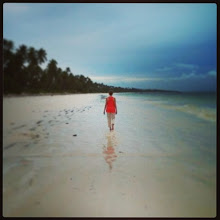Today I am writing to you from the deceivingly
deserted beach called Matemwe. For days now we have been the only obvious
tourists on an otherwise locals only corner of the island. In short, we could
not have found a more perfect location for our getaway.
Despite the fact there are very few hotels and guesthouses on this stretch of beach, the place is abuzz with activity. I'm looking out over a seaweed covered beach from my shade tree, the midday call to prayer setting the scene from another world. The air is sticky, there's not even the faintest breeze, and it's low tide making it impossible to swim in such shallow water. Instead, it's time for the women in the neighboring village to tend to their crops of seaweed in the shallow surf. There must be nearly a hundred women, swathed from head to toe in the most beautifully patterned "kangas", cultivating rows upon rows of coarse, leafy seaweed. Over the course of a few hours these women will drag countless bushels of seaweed from the sandbar to shore where it will dry in the afternoon sun over the next few days. Later the dried seaweed, now much lighter in weight, will be sold for cents on the dollar to a buyer who will then sell it at a substantial mark-up to be shipped all over the world. As it turns out, these Zanzibari women are growing a product that is used as a natural thickener and is processed in everything from toothpaste to soups.
Despite the fact there are very few hotels and guesthouses on this stretch of beach, the place is abuzz with activity. I'm looking out over a seaweed covered beach from my shade tree, the midday call to prayer setting the scene from another world. The air is sticky, there's not even the faintest breeze, and it's low tide making it impossible to swim in such shallow water. Instead, it's time for the women in the neighboring village to tend to their crops of seaweed in the shallow surf. There must be nearly a hundred women, swathed from head to toe in the most beautifully patterned "kangas", cultivating rows upon rows of coarse, leafy seaweed. Over the course of a few hours these women will drag countless bushels of seaweed from the sandbar to shore where it will dry in the afternoon sun over the next few days. Later the dried seaweed, now much lighter in weight, will be sold for cents on the dollar to a buyer who will then sell it at a substantial mark-up to be shipped all over the world. As it turns out, these Zanzibari women are growing a product that is used as a natural thickener and is processed in everything from toothpaste to soups.
By early afternoon this scene will quickly fade away
as the incoming tide literally forces the women to abandon their work and wade
to shore. The school day has also ended and the beach becomes a highway for
school children who create a steady stream of foot traffic as they hurriedly
make their way back to their villages under the oppressive afternoon sun. Men on bicycles pedal along the
shoreline and an occasional donkey cart passes by on its way to the village
market. In a matter of minutes, however, this flutter of activity disappears as
quickly as it arrived and suddenly Jeff and I are the only two souls on a once
again deserted beach. For the rest of the day it's just the two of us on our
own little slice of island paradise.
Aside from our one excursion to Jozani National Forest
and a tour of a spice farm, this has been our daily routine: wake-up late,
breakfast, sunscreen, beach, explore the seaweed plots, read, lunch, beach nap,
swim, beach, shower, dinner. We are in the middle of nowhere doing absolutely
nothing and it's everything we wanted. "Mambopoa".











Thanks for sharing such a cultural experience. I love hearing little stories like this!
ReplyDelete